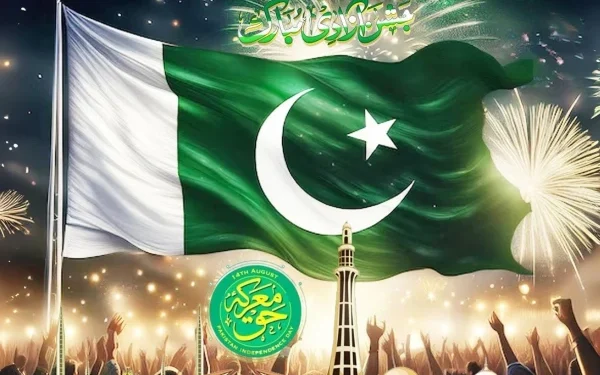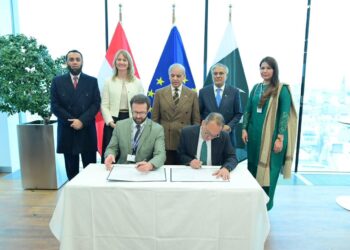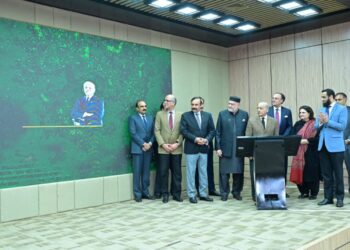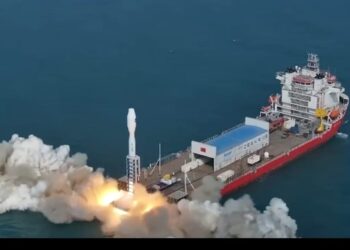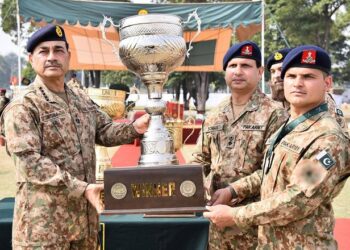Pakistan celebrates its 78th Independence Day with unmatched passion and nationwide festivities, dedicating this year’s theme to the “Great Victory of the Struggle for Truth.” From the stroke of midnight on August 14 to the day-long celebrations, the air across the country has been filled with patriotic zeal, unity, and a deep sense of gratitude toward the founders of the nation.
Midnight Celebrations: Streets Alive with Patriotism
As the clock struck midnight, citizens poured into the streets of major cities including Karachi, Lahore, Islamabad, Peshawar, and Quetta. Streets echoed with chants of “Pakistan Zindabad”, while small and large rallies, cultural performances, and street shows brought life to the dark hours.
The sound of dhol beats accompanied traditional bhangra dances, while patriotic songs blared from loudspeakers, creating an electrifying atmosphere. Entire neighborhoods came alive with green-and-white decorations, fairy lights, and flags fluttering from rooftops.
Traditional Salutes and Prayers for Prosperity
The morning of August 14 began with a 31-gun salute in Islamabad and a 21-gun salute in each provincial capital, a military tradition symbolizing honor for the nation’s sovereignty.
Special prayers were offered in mosques across the country, asking for Pakistan’s security, stability, and economic prosperity. Clerics emphasized the importance of unity, faith, and discipline—core values enshrined by Quaid-e-Azam Muhammad Ali Jinnah.
Cities Adorned in Colors of Freedom
Across Pakistan, government buildings, streets, bridges, and public spaces were decorated with electric lights and national flags. Major landmarks such as the Minar-e-Pakistan, Faisal Mosque, and Mazar-e-Quaid were illuminated in vibrant shades of green and white.
At midnight, spectacular fireworks displays in cities like Lahore and Karachi lit up the skies, symbolizing hope, resilience, and the unbroken spirit of the Pakistani people.
Public Participation: Rallies, Shows, and Festivities
Public participation was at its peak, with families and children carrying flags, wearing green attire, and adorning badges and face paint in the national colors. Rallies celebrating Pakistan’s independence took place in all provinces, accompanied by patriotic speeches, musical shows, and theatrical performances depicting scenes from the freedom struggle.
Main Ceremony at the Quaid-e-Azam’s Mausoleum
The central Independence Day ceremony took place at Mazar-e-Quaid in Karachi with a change of guards performed by the Pakistan Military Academy cadets. Dignitaries, including political leaders, military officials, and social activists, laid floral wreaths at the mausoleum, paying homage to Quaid-e-Azam Muhammad Ali Jinnah.
This symbolic act reaffirmed the nation’s commitment to Jinnah’s vision—a free, independent, and strong Pakistan.
Defense Exhibition in Islamabad
To showcase Pakistan’s military strength and technological advancements, a Defense Exhibition was held at the Parade Ground in Islamabad. Open to the public, the event displayed indigenous defense equipment, missile systems, drones, and armored vehicles, underlining the message that Pakistan stands ready to defend its sovereignty against any threat.
Unity Against External Threats
This year’s Independence Day also carried a strong message of defense readiness. Political and military leaders reiterated that any aggression from India would be met with a decisive and united response.
The statement not only highlighted Pakistan’s military preparedness but also served as a reminder of the sacrifices made by the armed forces to protect the nation’s borders since its creation in 1947.
Historical Context: The Struggle for Truth
The 78th anniversary marks over seven decades of resilience and progress since the historic moment on August 14, 1947, when Pakistan emerged on the world map after a relentless struggle led by the All-India Muslim League under Jinnah’s leadership.
This year’s theme—“Victory of the Struggle for Truth”—pays tribute to the sacrifices of millions who endured migration, hardships, and violence to achieve a homeland based on the principles of justice, equality, and religious freedom.
Pakistanis Abroad Join the Celebrations
Pakistani expatriates around the globe—from the United States to the Middle East, Europe, and Australia—organized flag-hoisting ceremonies, cultural events, and exhibitions to mark the day.
In embassies and consulates, special receptions were hosted where national anthems were sung, documentaries on Pakistan’s history were screened, and messages from Pakistani leaders were read out.
Cultural Significance of Independence Day
Independence Day in Pakistan is more than just a national holiday—it is a reaffirmation of national identity and collective spirit. Schools, colleges, and universities organized debates, quiz competitions, and essay-writing contests focusing on the ideals of freedom and national unity.
Children dressed as national heroes like Allama Iqbal, Fatima Jinnah, Liaquat Ali Khan, and Quaid-e-Azam, presenting speeches to remind the younger generation of the values upon which Pakistan was built.
A Call for National Renewal
Leaders across the political spectrum emphasized the need for political stability, economic reform, and social unity. They urged citizens to combat corruption, promote education, and work towards self-reliance—reminding that the true spirit of independence lies in strengthening the nation from within.
President and Prime Minister, in their Independence Day messages, stressed that Pakistan’s destiny is in the hands of its people, and that unity, hard work, and faith can overcome any obstacle.
Looking Ahead: Pakistan’s Vision Beyond 78 Years
As Pakistan enters its 78th year of independence, the celebrations are not only a reminder of past achievements but also a beacon for the future. With a young population, rich natural resources, and strategic importance, Pakistan holds immense potential to emerge as a leading nation in South Asia.
The 78th Independence Day serves as a call to action for the youth—to uphold the values of truth, justice, and unity, and to work tirelessly for a prosperous and peaceful Pakistan.
Conclusion
Pakistan’s 78th Independence Day celebrations were a blend of tradition, patriotism, and forward-looking resolve. From the streets filled with patriotic music to the solemn salutes at dawn, the day was a vivid reminder of the sacrifices that birthed the nation and the responsibilities that lie ahead.
The nation’s message was clear: Pakistan stands united, resilient, and ready to safeguard its independence for generations to come.
















